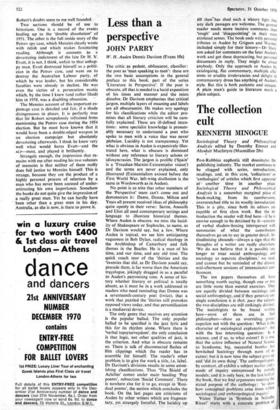Less than a perspective
JOHN PARRY
W. H. Auden Dennis Davison (Evans 10s) The critic as pedant, obfuscator, classifier: the poet as 'man speaking to men': these are the two basic assumptions in the general preface to this book, part of the series 'Literature in Perspective'. If the poet is obscure, all that is needed is a lucid exposition of his times and manner and the mists dissolve. Dr Davison emphasises that critical jargon, multiple layers of meaning and labels are all obscurantist. He makes wry apology for his classifications while the editor pro- mises that all literary criticism will be care- fully explained. These are ill-defined inten- tions: some specialist knowledge is presum- ably necessary to understand a poet who spoke to men with a voice that was never' plebeian. Lucidity is not transparency. Yet what is obvious in Auden is expansively illus- trated here, what is obscure is dismissed without any reference to literary echoes or idiosyncrasies. The jargon is prolific ('Spain' is a 'Freudian-Marxist-Existentialist vision') and the terms are never explained, only illustrated (Existentialism existed before the First World War, left-wing disillusion is the same in Wordsworth as in Auden).
No point is so trite that other members of the 'Perspective' team can't come out and demonstrate it: Dante, Donne, Milton and Yeats all present received ideas of philosophy quite openly in their verse: Sartre, Anouilh and Eliot all used contemporary settings and language to illustrate historical themes. Where Auden is obscure, we miss the lucid- ity of Shakespeare or Sophocles, to name, as Dr Davison would say, but a few. Where Auden is topical, we see him anticipating vagueness in Bob Dylan, radical theology in the Archbishop of Canterbury and folk themes in the Beatles. He is a man of his time, and our time, and any old time. The quick coach tour of the 'thirties and the 'twenties that did, as Dr Davison would say, precede them, is far worse than the American travelogue, jokingly dragged in as a parallel to Auden's patronising tone. A sense of his- tory whether literary or political is totally absent, as it must be in a work addressed to readers who need reminding that Donne was a seventeenth-century poet (twice), that a work that puzzled the 'thirties still provokes opposed views today, and that personification is a mediaeval device.
The only genre that receives any attention is the popular ballad. The only popular ballad to be specified is the jazz lyric and this for its rhythm alone. Where there is 'verbal topsyturveydom', the only conclusion is that logic, not other qualities of jazz, is the criterion. And what is obscure remains so. There is talk of disconnected flashes of film clippings which the reader has to assemble for himself. The reader's other problem is to give the work a title, i.e. label. Dr Davison's divisions results in some aston- ishing classifications. Thus 'The Shield of Achilles' comes under main heading 'Pop poems', subsection 'Social Comment'. There is nowhere else for it to go, except in 'Resi- dual poems', the section which concludes the book. On the last pages are criticisms of Auden by other writers which are fragmen- tary, yet strangely forceful. The lucidity up
till then.has shed such a Watery light that any dark passages are welcome. The general reader needs more incisive comments than 'tough' and 'disappointing' in their most etiolated senses. The book ends with personal tributes to Auden by Grigson and Warner, included simply for their history—Dr Davi- son asked for comments on the later Auden's work and got these deprecating, but personal documents in reply. They might be about anybody. Only the approach to Auden by cataloguing, flat commentary, multiple allu- sions to erudite irrelevancies and delight in contemporary dross has anything of Auden's style. But this is both pedantic and opaque. A plain man's guide to literature needs a plain subject.










































 Previous page
Previous page